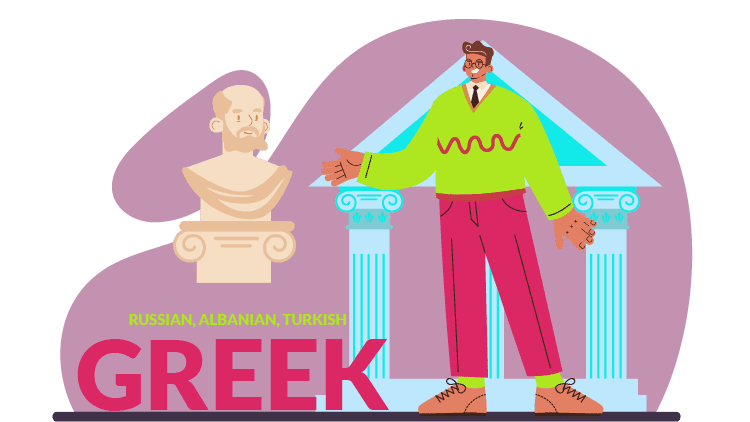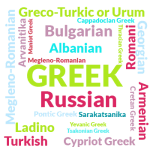
What are hellenic Languages? Languages Spoken in Greece
What Are the Hellenic Languages?
The Hellenic languages are languages that descended from the ancient Greek language. The term Hellenic was first used by German and Dutch scholars to describe these dialects, which include Attic Greek, Koine Greek, and Medieval Greek. Today, three of the four primary Hellenic languages are dead or no longer spoken: Ancient, Koine, and Medieval Greek; only Modern Greek is currently in use. In this article, we’ll look at what the Hellenic languages are and how they differ from other linguistic groups in the world today.
The official language of Greece is Greek which the Greeks themselves call Hellenic. This is one of the oldest written languages of peace. It comes from ancient Greek, which significantly influenced the languages and culture of other European peoples – the language of philosophy, science, medicine, the language of the New Testament and many orthodox written monuments.
Greek Language
The modern official and ancient Greek languages differ similarly from Russian and Old Slavic. The inhabitants of Greece kept the alphabet, most of the vocabulary, and many rules of grammar, but over several millennia its sound and many features have changed significantly, including under the influence of the Byzantine Empire and Ottoman conquest, that’s why modern Greeks poorly understand texts written in ancient Greek.
The Greek language in its structure resembles Russian: it includes divisions into three genders, numbers and cases (4 cases, as opposed to 6 in Russian), and conjugations of verbs by numbers and persons. The only significant difference is the widespread use of articles, which are even more common than in English.

Official language of Greece
Ancient Greek is very similar to modern, but this similarity is easily compared with, for example, Russian and Church Slavonic. Yes, the Greeks understand their ancient language. But for them it is already obsolete. A change in phonetics began in the 18th and 19th centuries. Modern Greek terms appeared. The changes mainly affected the pronunciation of vowels. The length and brevity of the tones have lost their former meaning. Various accents have also been reduced – sharp and dull.
That’s certainly an example of the way in which Greek literary forms and Greek language impacted Jewish civilization and literary traditions. That impact extends far beyond scripture, and we see during the Hellenistic period Jews adopting literary forms of the Greek tradition, and writing plays, epic poems, lyric poems, all in the Greek language.
What dialects do Greeks speak?
The phenomenon of branching off from the main common language very common. It was also in ancient Greek. Played special role as an island country uniting city poles on islands and continents. In the course of development, these dialects have changed. Nevertheless, several main types can be distinguished, from which modern ones have also emerged in some ways:
- Ionian dialect (written by Herodotus).
- attic.
- Dorian.
- Aeolian.
What official language in Greece we found out is the modern Greek language. However, it also has types: literary and regional dialects.The written language is divided into Kafarevusa (a continuation of the classical Attic dialect) and Dimotica (based on the dialects of Central Greece or Folk).

What is the origin of the ancient Greek language?
Greek is one of the main branches of the Indo-European language family. It evolved from the original Indo-European language, perhaps through one or more intermediate stages, such as the Balkan Indo-European language. There are a number of hypotheses for the period of the formation of the Greek language, which probably coincides with the immigration of the Indo-Germanic people to the Balkan Peninsula in the early Bronze Age. They are in the range from 3600 BC. before 2000 BC The immigrating Indo-Germans met with a highly culturally developed native population, which the Greeks later called the Pelasgians.
Morden History
The Hellenic languages belong to a family of languages that were first spoken by inhabitants of Crete in antiquity. The term ‘Hellenic’ comes from ancient Greek and simply means ‘pertaining to Greece.’ It is derived from ‘Hellas,’ an alternative name for Greece. Over time, other nations also adopted Hellen as a part of their own names, such as Hellenes (the Greeks) and Helleens (the French). However, they did not embrace all aspects of Hellenism like language. Today, most scholars agree that there are four main Hellenic languages: Modern Greek, Ancient Greek (or Koine), Byzantine Greek, and Cypriot-Greckish.
Spoken in Which Countries
Hellenic languages are spoken in Greece and Cyprus. They’re also spoken by Greek people living in countries like Australia, France, Great Britain, Canada, and Germany. For that reason, you will sometimes see these languages called Ancient Greek or Modern Greek. People who study these languages use a specific kind of alphabet.
Related languages
Ancient Greek is by far and away from the most famous member of the Hellenic language family. Due to its status as an important historical, literary, and scientific language, people have come to associate Hellenic with Ancient Greek. However, in actuality, it is only one branch of a larger family. Modern languages like Modern Greek (spoken in Greece), Modern Macedonian (spoken in Macedonia), and Armenian all belong to that same family. The other major branches include Anatolian languages (such as Hittite) and Indo-European languages (such as English).
Similarities with other Indo-European Languages
The Greek language is very closely related to English, as it is also a member of the Indo-European family. More precisely, it belongs to Hellenic or Greek branch of Indo-European languages. This means that both English and Greek share many similarities in their grammar and vocabulary, which makes them relatively easy for speakers of one exact language to learn another. For example, both languages have gender-specific nouns (such as brother vs sister), and verbs that conjugate based on person (I am going vs we are going). Many words in both languages even come from Latin roots!
Writing System
Ancient Greek was written in a variety of different systems, most of which have been lost. However, surviving texts like Homer’s Iliad and Odyssey make it possible to understand how some of these systems worked. The oldest inscriptions we have in Ancient Greek are in a script called Linear B. Although Linear B was originally used for accounting, it was later adapted to write down works of literature (like Homer’s poems) and religious texts.
There is also evidence that other scripts were used alongside Linear B at various times. For example, fragments of an alphabet known as Cypriot syllabary have been found in Cyprus. This suggests that there may have been some kind of bilingualism between Greek speakers and people who spoke ancient languages using Cypriot syllabary. Some scholars think that Linear B was actually invented by speakers of another official language, such as Minoan or Eteocretan, who then taught it to their neighbors on Crete. Throughout its history, the extraordinarily flexible English language has borrowed terms from every possible source.
The Greek language in its current form (spoken and written) Late Greek was a Greek dialect that thrived throughout the Roman Empire, while Ancient Greek is the present Greek vernacular Katharevusa. “Ancient Macedonian as a Greek dialect: A critical review of the current study (text in Greek, English, French, and German).” Because of Athens’ political and cultural prominence during the classical period of Greek history, Attic became the dominant dialect.
Moreover, a variety of the Greek alphabet is still used today for the Greek language. Actual usage of the grave in handwriting saw a rapid decline in favor of uniform usage of the acute during the late 20th century, and it has only been retained in typography.
How old is the Indo-European Language Family?
The Indo-European language family may be traced back over 6,000 years to a protolanguage that existed. The protolanguage was split into dialects, which developed into independent ancient languages and subsequently fissioned into successive generations of daughter languages. The Hellenic languages are a subset of the Indo-European language family. Proto-Hellenic terms by etymology: Proto-Hellenic terms are categorized by their etymologies.
Macedonian language is a South Slavic language spoken in the eastern part of the country. It is a Slavic language that is part of the wider Balto-Slavic branch of languages – Indo-European language family. Two million individuals speak it as their first language. Language code for Proto-Greek Scripts from the same language family The language of Proto-Hellenic has been rebuilt. A language code is a system for assigning letters or numbers to languages as identifiers or classifiers. These codes can be used to arrange library collections or data displays, to choose appropriate localizations and translations in computers, and as a shorthand for lengthy language names.
The ancient language most closely connected to it may have been ancient Macedonian, which most academics believe was a Greek alphabet. History Linear B and Linear A was the first script used to write Greek culture, dating back to the late 15th century BC. The biggest phonological changes happened throughout the Hellenistic and Roman periods (for further information, see Koine Greek phonology): the pitch accent was replaced by a stress accent. The instrumental case of Mycenaean Greek vanished in the Archaic period, while the dative/locative of Ancient Greek vanished in the late Hellenistic period.
What was the Greek cultural nation like?
Until the 19th century, Greece never had a nation state, but a community of Greek small and city states bound by a common culture, religion, and language.The various peoples of the Greeks determined their belonging to the Hellenes through various variants of the Greek language and through the Olympian cult in religion.
Religious festivals such as the “Mysteries of Eleusis”, which brought together the inhabitants of all Greek peoples, formed a unifying, almost national manifestation in the politically fragmented Greek world, often marked by mutual competition or war. The four Pan American Games (including the Olympic Games), in which ethnicity was a deciding factor for participation, also contributed to a stronger sense of belonging among the various Greek tribes, in line with the concept of Greece.

What is Hellenism?
Hellenism (Greek: Ελληνισμός, Ellinismos) is a term used to describe the cultural and religious influence of Ancient Greece on the Roman Empire. The term was coined
With the empire of Alexander the Great, Greek became the official language of the vast empire. Greek became the lingua franca of the Middle East and remained so when the Eastern Mediterranean came under Roman rule. An important characteristic of this historical period is the intensification of Hellenization, the penetration of Greek culture into the East and, in turn, the growing influence of Eastern culture on the Greeks. The Hellenistic world covered a huge territory that stretched from Sicily and Lower Italy (Magna Graecia) to Greece and India, and from the Black Sea to Egypt and today’s Afghanistan.
Hellenism meant the development from classical Greek culture to civilization with global dimensions that was now open to all. Accordingly, the concept of the “Greek peninsula” has evolved from the meaning of an ethnic Greek to a cultural concept that includes those who have subordinated their lives to Greek values. With the beginning of Christianization, the Greek language also acquired the importance of the church language in the west of the Roman Empire.
Before we talk about a country’s language, it is worth mentioning the people who speak it. In Greece, 96% of the total population are Greeks. They used to be called Hellenes. These people are very old, about two thousand years BC. They inhabited the territory of modern Greece. Proto-Greek tribes assimilated the native Pelasgians. The history of the great Greek civilization began.
The heyday of the culture of the ancient Hellenes began in the fifth century BC. The Greeks gave the world enormous wealth for mankind. Including incredibly logical and concise, beautiful language. Myths, poems, poems, and philosophical treatises were written on it.
History of the Greek Alphabet
The Minoan script proved to be very inconvenient. The writing could not develop fully. It was the Phoenician merchants in Greece who began using the alphabet for writing. The first alphabet appeared in the 9th century BC. and existed in this form until about 8. That is, the Hellenic alphabet developed on the basis of the Phoenician language and writing. It is incredible that in Greek we find vowels and consonants at the same time.
The Hellenes changed the phonetics of the Phoenician letters and translated the sound into their own language. Regarding the ancient Greek language, there are several schools that indicate what it used to look like. Some read the letter “b” as Russian “b” – betta and others as “v” – vitta. Ancient Greek was prevalent in the Balkan peninsula, the Greek islands, W Asia Minor, S Italy, and Sicily.
The modern Greek alphabet consists of 24 letters. It is also worth noting that both the Latin and Cyrillic alphabets were formed from it. The Greek alphabet has become the model, the basis of many other languages. The first letter in the Greek alphabet is alpha (α), which means “first” or “beginning”.
This letter was used to write the name of God. In fact, the word for God in ancient Greek script. The Perseus Projecthas many useful pages for the study of classical language and literatures, including dictionaries. These marks were introduced during the course of the Hellenistic period. Greek texts has occasionally been written in the Latin script, especially in areas under Venetian rule or by Greek Catholics.
After Alexander the Great the koinē developed into an international language that remained current in the central and E Mediterranean regions and in parts of Asia Minor and Africa for many centuries. At this time, European scholars were attracted by the word parallels between their own ancient languages, namely Latin and Greek, and Sanskrit, India’s classical language, which was only then being known in the west.

How did the decline of the Greek language happen?
In 693, Greek was replaced by Arabic as the official language in the areas conquered by the Muslims. As a result, Greece was already strongly suppressed in these areas in the early Middle Ages. In the early 7th century, the Slavs began a steady land grab in the Balkans, but this was mostly concentrated in the hinterland, while the (partially) fortified towns along the coast remained uninterrupted in Greek hands. Separate language status is most often posited for Hellenic Hellenic constitutes a branch of the Indo-European language family.
It was also used as a liturgical language in the Christian Nubian kingdom of Makuria which was in modern-day Sudan. Official status Greek, in its modern form, is the official language of Greece, where it is spoken by almost the entire population. The evolution of history During the Hellenistic period, which began at the end of the 4th-century b.c. and lasted until the 5th-century BCE, Greek progressively gained a high degree of homogeneity throughout the territory it encompassed (see Koine).
However, the morphological changes also have their counterparts in the syntax, and there are also significant differences between the syntax of the ancient and that of the modern form of the language. Latin Alphabet, Arabic Alphabet.
After the conquest of Constantinople (1453), Athens (1456), the Peloponnese (1459/60) and the Empire of Trebizond (1461) by the Ottomans, the status of Greek as a state language ended until the emergence of modern Greece in 1832. Cambridge, UK: Cambridge University Press.Medieval and Modern GreekISBN978-0-521-23488-7.Dawkins, Richard McGillivray; Halliday, William Reginald (1916). Jena, Germany: Max Planck Institute for the Science of Human History.Glottolog 3.0 Medieval and Modern Greek, Cambridge: Cambridge University Press.
Given their limited literacy, listening to religiously edifying texts like the GreekMi’rjnma was a crucial means for them to learn about their faith. ohchr.org. “Universal Declaration of Human Rights.” www.un.org. “Universal Declaration of Human Rights.” Sources[edit] Margaret Alexiou (1982). “In Greece, Diglossia.”
The Lillian Claus Professor of New Testament Yale Divinity School JEWISH DIALOGUE WITH HELLENISTIC CULTURE
Jewish culture and civilization during the Hellenistic period were in intense dialogue with Hellenistic culture and civilization, beginning with the translation of Hebrew scriptures into Greek, a translation which survives and which we know as the Septuagint. Early Christianity engaged Hellenistic culture generally, and more specifically Greek philosophy, from the end of the first century on. This literary form constituted the mainstream of GreekTourkogianniotesliterature from the middle of the seventeenth century until the Aljamiado population exchange between Greece and Turkey in 1923.
- London: Routledge, p. 1.Ancient Macedonian The Linguasphere Register of the World’s Languages and Speech Communities (1999/2000, Linguasphere Press).
- Crespo, Emilio (2018). “The Softening of Obstruent Consonants in the Macedonian Dialect”
- p. 329.ISBN978-3-11-053081-0.Hatzopoulos, Miltiades B. (2018).”Recent Research in the Ancient Macedonian Dialect: Consolidation and New Perspectives”.
- Bristol: Bristol Classical Press.ISBN978-0-906515-69-3.OCLC7326206.”Cypriot syllabary”.Britannica Academic.
- Hatzopoulos, Miltiades B. (2018).”Recent Research in the Ancient Macedonian Dialect: Consolidation and New Perspectives” Manchester: Manchester University Press.
- In Mallory, James P.; Adams, Douglas Q. (eds.).Encyclopedia of Indo-European Culture.
- London and Cambridge: The Belknap Press of Harvard University Press, 1978.
- Indiana University Press.Oxford University Press.
Cambridge, MA: Harvard University Press.Greek GrammarISBN978-0-674-36250-5.
FAQs
Where is the Hellenic language spoken?
Greek is the official language of Greece and Cyprus, as well as one of the European Union’s 24 official languages. Today, it is spoken by at least 13.5 million people in Greece, Cyprus, Italy, Albania, Turkey, and other Greek diaspora nations.
Is English a Hellenic language?
Although Greek is the official language of Greece and Athens, English is commonly spoken as well, so you should have no trouble getting around the city. In Greece, English is commonly spoken, particularly in the city’s most touristic areas.
Which official language is related to Greek?
The official language of Greece is Greek, which is spoken by the great majority of the country’s 10.7 million inhabitants. Macedonian (also known as “Slav-Macedonian” in Greece), Albanian (spoken in the center and south), Turkish (spoken by Muslim groups surrounding the Aegean), Arumanian, and Bulgarian are the other languages spoken.
What is prehistoric Greece?
The Palaeolithic period is generally understudied in Greece because research has traditionally focused on the later parts of prehistory (Neolithic, Bronze Age) and the Classical times.
What languages use Greek script?
The Greek alphabet is now solely used to write Greek script, although it has also been used to write Lydian, Phrygian, Thracian, Gaulish, Hebrew, Arabic, Old Ossetic, Albanian, Turkish, Aromanian, Gagauz, Surguch, and Urum at various times in the past.
What languages use Latin script?
The Latin script is used in the majority of European languages, such as English, French, Spanish, Italian, Dutch, Norwegian, German, Portuguese, Czech, Slovak, Hungarian, Polish, Danish, Welsh, Swedish, Icelandic, Finnish, and Turkish.
